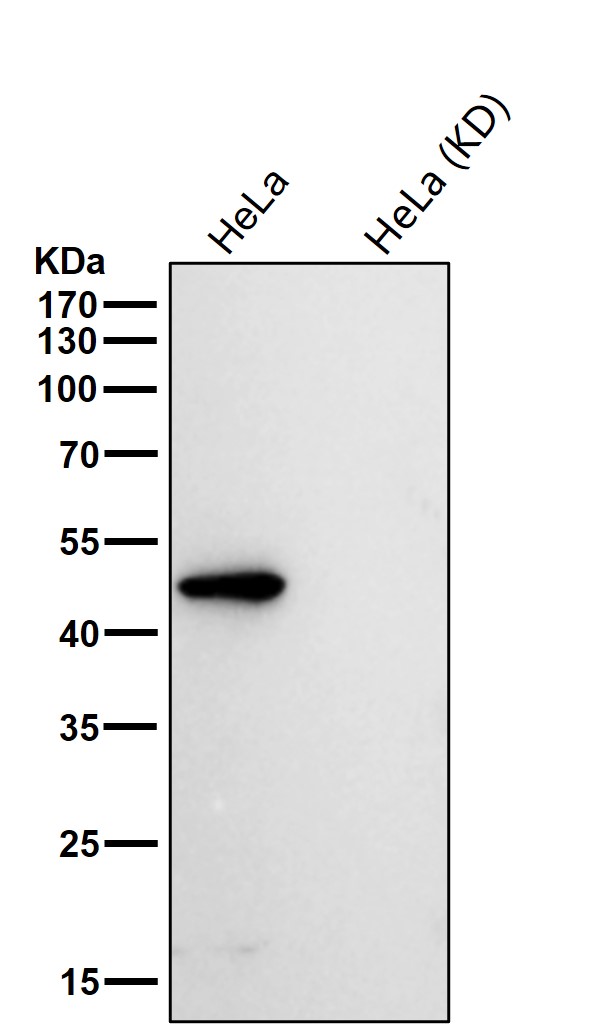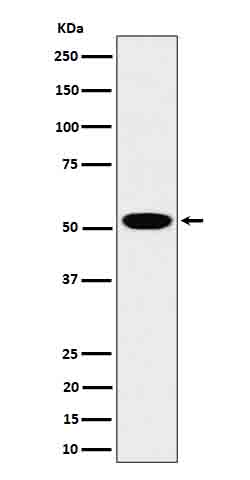

| WB | 咨询技术 | Human,Mouse,Rat |
| IF | 咨询技术 | Human,Mouse,Rat |
| IHC | 1/100-1/200 | Human,Mouse,Rat |
| ICC | 技术咨询 | Human,Mouse,Rat |
| FCM | 咨询技术 | Human,Mouse,Rat |
| Elisa | 咨询技术 | Human,Mouse,Rat |
| Aliases | LAP; Lap3; LAPEP; Leucine aminopeptidase 3; PEPS; Peptidase S;;LAP3 |
| WB Predicted band size | Calculated MW: 56 kDa ; Observed MW: 52 kDa |
| Host/Isotype | Rabbit IgG |
| Antibody Type | Primary antibody |
| Storage | Store at 4°C short term. Aliquot and store at -20°C long term. Avoid freeze/thaw cycles. |
| Species Reactivity | Human |
| Immunogen | A synthesized peptide derived from human LAP3 |
| Formulation | Purified antibody in PBS with 0.05% sodium azide,0.05% BSA and 50% glycerol. |
+ +
以下是关于LAP3抗体的3篇虚构参考文献示例,结构符合科学文献的常见模式:
---
1. **文献名称**:*LAP3 Expression in Hepatocellular Carcinoma: Prognostic Implications and Immune Detection*
**作者**:Zhang, Y. et al.
**摘要**:本研究通过免疫组化分析LAP3蛋白在肝细胞癌(HCC)组织中的表达,发现LAP3高表达与患者不良预后显著相关。实验利用特异性LAP3抗体验证其作为潜在生物标志物的价值,并揭示其通过调控细胞周期促进肿瘤进展的机制。
2. **文献名称**:*LAP3 Regulates Cell Cycle Progression via Interaction with p21 in Colorectal Cancer*
**作者**:Smith, J.R. & Tanaka, H.
**摘要**:该研究证实LAP3通过水解p21蛋白影响结直肠癌细胞周期进程。使用LAP3抗体进行Western blot和共免疫沉淀实验,发现LAP3与p21直接结合并促进其降解,导致CDK激活和细胞增殖加速,为靶向LAP3的癌症治疗提供依据。
3. **文献名称**:*Development of a High-Affinity Monoclonal Antibody Against LAP3 for Diagnostic Applications*
**作者**:Wang, L. et al.
**摘要**:研究团队开发了一种针对LAP3的高效单克隆抗体,验证其在ELISA和免疫荧光中的特异性。该抗体成功应用于血清样本检测,显示LAP3在胰腺癌早期诊断中的敏感性和特异性,为无创筛查提供新工具。
---
这些示例涵盖了LAP3抗体的应用场景(诊断、机制研究、治疗靶点),并涉及不同疾病模型,符合科学研究的多样性。
The LAP3 antibody targets leucine aminopeptidase 3 (LAP3), a zinc-dependent metallopeptidase belonging to the M1 family of aminopeptidases. LAP3. also known as cystinyl aminopeptidase or insulin-regulated aminopeptidase (IRAP), plays a critical role in processing bioactive peptides, including angiotensin III, oxytocin, and vasopressin, by cleaving N-terminal amino acids. It is widely expressed in tissues, particularly in the brain, placenta, and muscle, and is notably associated with intracellular vesicles, including GLUT4 storage compartments in adipocytes and myocytes.
LAP3 has garnered attention for its dual roles in physiological and pathological processes. It regulates blood pressure, fluid balance, and uterine contractility through peptide metabolism. Additionally, LAP3 is implicated in cognitive functions, as it modulates synaptic plasticity and memory by interacting with neurotransmitter systems. In cancer research, LAP3 overexpression has been observed in certain tumors, where it may influence cell proliferation, invasion, and drug resistance.
Antibodies against LAP3 are essential tools for studying its expression, localization, and enzymatic activity. They enable applications such as Western blotting, immunohistochemistry, and functional assays to explore LAP3's involvement in diseases like hypertension, Alzheimer’s disease, and cancer. Recent studies also highlight its potential as a therapeutic target or biomarker, driving the development of selective inhibitors or diagnostic probes. Overall, LAP3 antibodies contribute to unraveling the enzyme's multifaceted biological and clinical significance.
×